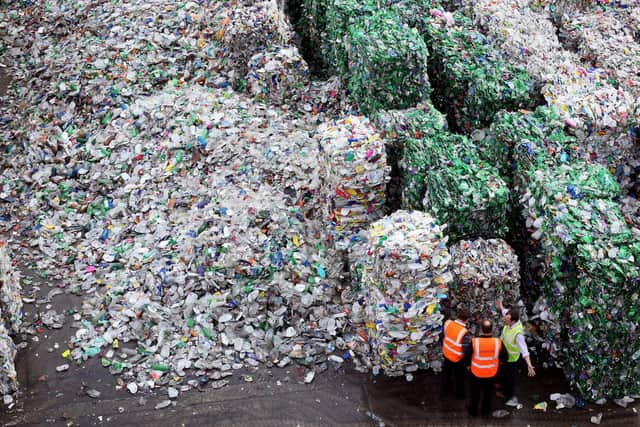Plastic pollution: How recycling is being used by big business to greenwash the damage they are causing to the planet – Stephen Jardine
In the case of the apple, the challenge was how to keep the fruit moist, firm and fresh. The solution was for the fruit to develop it’s own waxy coating to seal in the goodness and, since Adam and Eve, that’s worked pretty well.
Then along came supermarket retailers and, of course, they knew better. Not content to let the apple protect itself the way it had done since the dawn of time, they decided it needed to be wrapped in plastic. Or better still, in a carboard tray with a sturdy plastic lid.
Advertisement
Hide AdAdvertisement
Hide AdAnd that trend is why the Big Plastic Count came up with its appalling findings this week: a survey of 100,000 households concluded that the UK throws out about 100 billion pieces of plastic every year with recycling not even making a dent in the issue.
According to Greenpeace, only 12 per cent of that ends up being recycled with 25 per cent going to landfill and 46 per cent being burned. “Pretending we can sort this with recycling is just industry greenwash,” said a spokesman.
Plastic comes in all shapes and sizes but the survey is clear that food retail is where the biggest problem lies. For the average household, 83 per cent of the plastic thrown out every week is from that source with the most common items being fruit and vegetable packaging.
Recently, recycling has been a way for us to feel a bit more comfortable about the crisis facing our planet. By washing out milk cartons and carefully disposing of yoghurt pot lids, we get the sense we’re doing our bit to avert oblivion and can thus sleep safe. The reality is rather different.


"Recycling doesn't work, we all know it," said Everyday Plastic founder Daniel Webb. "If we think things are being recycled, we can carry on the way we are.”
Recycling also puts the responsibility on us. We feel guilty if we forget to take a bag to the supermarket and buy a new one. We chastise those who put things in the wrong bin or don’t realise many coffee cups are not disposable.
The truth is, this isn’t our fault. The blame for the plastic epidemic lies with the food manufacturers and major retailers. Down the years, they have conditioned us to expect fruit and vegetables to come wrapped in plastic to the extent that when one supermarket recently tried to move away from that, they instantly lost market share.
We need to break the belief system behind this. Instead of organisations like Zero Waste Scotland nagging consumers to recycle better, resources should be put into public information campaigns to raise awareness of the damage plastic does to our own environment so we demand change.
Advertisement
Hide AdAdvertisement
Hide AdGovernments should also be legislating to restrict plastic packaging in big retail and offering green tax breaks for those trying different solutions.
New laws on single-use plastics like straws and stirrers were introduced last month but they are a drop in the ocean. We need to go further and faster.
Consumers have a role to play in demanding change and using their spending power, but it will only come when big business chooses to take a different approach or is forced to do so.
Comments
Want to join the conversation? Please or to comment on this article.
